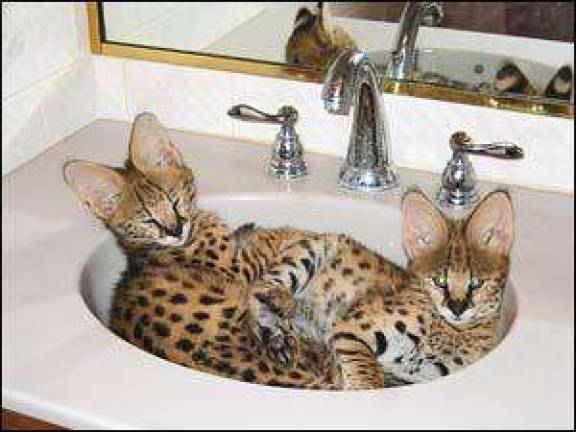New season begins at Space Farms

WANTAGE Space Farms Zoo and Museum in Wantage opened April 2 with two new exhibits: African servals and South American coati. The servals’ new enclosure includes multiple diameter locust tree branches for climbing. A spacious open den perched at human eye level lets these cats feel safe and protected. The roomy enclosure facilitates the natural behavior of the cat. African servals have notably large ears and can hear the noises mice make at levels the human ear can not. When hunting, servals will stop and close their eyes to listen for prey. With a tawny coat and black spots, they are often called a dwarf cheetah. Swift on the hunt, the serval can run up to 50 miles per hour. Their long legs enable the them to leap horizontally 20 feet to pounce on and stun their prey. Servals are capable of jumping 16 feet straight up to catch birds in flight. These mid-sized cats are often seen in the wild tossing their bird prey into the air repeatedly, essentially plucking the bird. With a 50 percent success kill rate, the servals outscore the 10 percent kill rate of the larger felines, such as lions. Servals make numerous vocalizations. They purr, chirp, hiss, cackle, growl, grunt and meow. The servals at Space Farms Zoo came from the Natural Bridge Zoo in Virginia as small kittens and were raised on a bottle by Lori Space Day, the zoo momma. “They were interesting to have in my home, jumping and stalking us. They loved to cuddle up in my bathroom sink,” said Space. “Now they are full grown, at about 40 pounds. Prior to 1971 any one could have them as a pet, but the laws have changed, for good reason. They have three-inch long teeth, and can get aggressive.” Coati is kept as house pet The coati, also called coatimundi, is native to Central and South America. A member of the same family as the raccoon, the coati’s diet consists of fruits, vegetables, insects and small rodents. In South America the coati is kept as a house pet, similar to a free roaming cat, to help keep the homes free of vermin. Their prehensile nose seeks out insects. Long claws facilitate climbing. A long beige and black striped tail helps with balance. The striped tail is held erect when coati travel in groups of up to 15 on the ground. The flashy tail is also used as a signal flag to other coati. Cute teddy bear ears cap a masked face similar to its North American cousin, the raccoon. The coati vocalize with a tweet, chucker and a hum. The coati came to Space Farms Zoo from Claws and Paws Zoo in Pennsylvania. Avid climbers, the coati have a home which includes a center tree trunk with branches to climb. The coati have adjusted to their new home, digging up the grass to look for insects among the large boulders. “Diego and Chiquita are lots of fun,” said Hunter Space, the fourth generation at Space Farms Zoo and Museum. “But a little smelly because of their scent glands. They climb all over me and love to look for bugs in my ears.” The servals and coati are permanent exhibits at Space Farms Zoo. Easter Bunny will host egg hunt A special animal will join the Space Farms family during Easter Week. The Easter Bunny will arrive Thursday, April 21 through Sunday, April 24 to join visitors for breakfast in the Space Farms restaurant from 8:30 to 11 a.m.. On Saturday, April 23 the Easter Bunny will host an Easter Egg Hunt on the zoo grounds. The children that find the huge white ostrich egg and blue-green emu eggs will win grand prizes. Other special activities include Walking with the Mouflon Lambs, hands-on with chicks and bunnies, and an educational chat about city and country eggs. Space Farms Zoo and Museum is located on Route 519 in Wantage. Admission is $14 per adult, $9.50 per child and $13 per senior. For more information call Space Farms at 973-875-5800 or visit www.spacefarms.com.